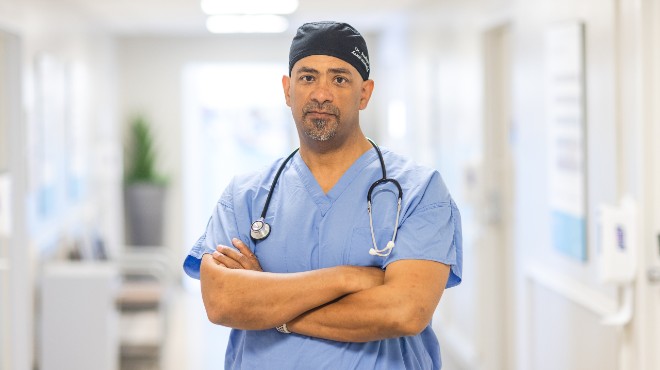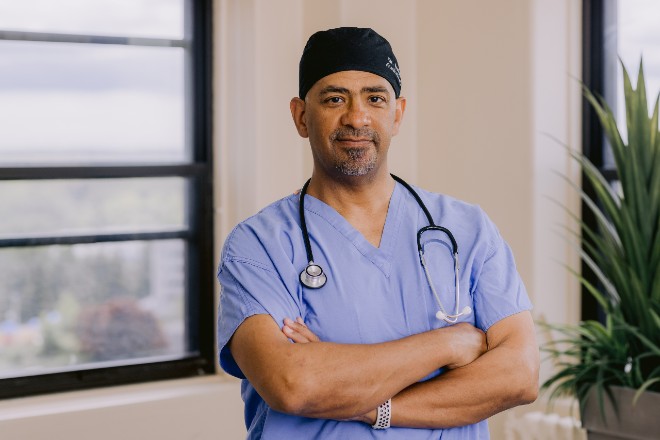
Doctors Nova Scotia’s new president wants to stabilize primary care
Halifax-based anesthesiologist and Dal alum Dr. Colin Audain hopes contract negotiations create a path for stronger relationships with allied health professionals and improved access to care.
Reprinted with permission from Doctors Nova Scotia
Doctors Nova Scotia (DNS) has a new president. Dal alum Dr. Colin Audain (MD’02), a Halifax-based general anesthesiologist, was sworn in as DNS’s new president at the association’s annual conference on June 10.
“During my term, I hope to see primary care stabilized in the province,” said Dr. Audain. “Although it’s not the only problem in health care, in my opinion, it is the most pressing today.”
Dr. Audain becomes president as contract negotiations are at their peak, with hopes of a confirmed deal in the offing. “In this moment, contract negotiations between DNS and the provincial government are critical to the future of health care in the province. I hope to see us reach an agreement and a path forward that will ensure the best care for the people of Nova Scotia,” he said.
Trying to do more with less
He sees the overall lack of health-care resources in his daily work and witnesses its negative effects on the health-care team as health-care providers try to do more with less. Over time, this leads to burnout, and he fears the result may be further reductions in health human resources.
“Patients’ confidence in the health-care system and physician morale seems to be at an all-time low,” he said. “If we can achieve a blueprint for improving Nova Scotians’ access to health care that makes it easier for physicians to provide that care, it will be an important achievement.”
Dr. Audain believes there are opportunities in the new contracts to work with health-system partners to improve health care in Nova Scotia – opportunities that have not existed for quite some time.
Welcoming demeanour, strong advocate for inclusion
 Throughout his career, Dr. Audain has sought opportunities to contribute meaningfully to the health-care system. Those who know him attest to his welcoming demeanour, thoughtfulness, excellent communication and organizational skills, and his many leadership qualifications, developed through education and experience.
Throughout his career, Dr. Audain has sought opportunities to contribute meaningfully to the health-care system. Those who know him attest to his welcoming demeanour, thoughtfulness, excellent communication and organizational skills, and his many leadership qualifications, developed through education and experience.
As a member of the Promoting Leadership in Health for African Nova Scotians advisory committee and the Black Physicians of Nova Scotia Society, Dr. Audain is acutely aware of the importance of equity, diversity and inclusion.
In assuming the presidency of DNS, Dr. Audain follows in the footsteps of his father, Dr. Vincent Audain. The elder Dr. Audain, an ophthalmologist, was president in 1988–89.
Learning to believe in himself
After completing his undergraduate degree at Mount Allison University, Dr. Audain wasn’t sure of his career path. Medicine was on his radar, but it seemed unattainable to him. He had seen his father wake early each morning to complete work before his official workday began, a habit that began in university.
“I knew that I did not have the discipline to put in those hours to study and so I did not give medicine serious consideration until I had moved back to Halifax,” he said.
Living with friends who were medical students, he was able to see firsthand what was required to be successful in medical school. “It was an exciting time for them, and I would hear in detail what they were learning. It became clear to me that although my friends were working hard, they did not keep the hours my father did.”
Life lesson during his time at Dal
Ironically, it was not until he started medical school at Dalhousie University (1998–2002) that he learned more about his father’s early hours and the reason behind his work patterns.
“When he was living in the Caribbean, he worked in the public sector and after work he would stay up late ‘liming’ (a Caribbean term for ‘socializing’) with his friends,” said Dr. Audain. “He became accustomed to limited sleep and when he started university in Canada, he decided to use that extra time to study.”
Dr. Audain was initially uncertain about choosing a specialty, but leaned toward one with a significant procedural component. That is what initially drew him to anesthesiology; then he became fascinated by how a patient’s physiology is manipulated in the operating room.
“Unlike other physicians, who prescribe medications to their patients and must wait until they see them in follow-up before they can see the impact of their prescription, anesthesiologists see the impact of their treatment in real-time,” he said.
A team player
Since 2007, Dr. Audain has been a staff anesthesiologist at the Victoria General and the Halifax Infirmary. In recent years, he has also worked occasionally at Dartmouth General Hospital, due to ongoing redevelopment of the QEII Health Sciences Centre.
As a former athlete who played team sports, he enjoys the camaraderie of being part of the operating room team. “The OR is a very social environment and is a fun place to work,” he said. “Every day presents different problems to solve with the OR team. Everyone has an important role to play, and it requires teamwork to be successful.”
In addition to his clinical work, Dr. Audain is an assistant professor in the Faculty of Medicine at Dalhousie, teaching medical students, residents and other learners.
His wife, Dr. Lori McDonald, is a radiologist specializing in breast imaging. The couple have two teenage daughters.
In his free time, Dr. Audain enjoys travelling, plus playing, watching and coaching sporting events, although, he said, “these days I spend more time watching and coaching sports than I do actually playing them.”